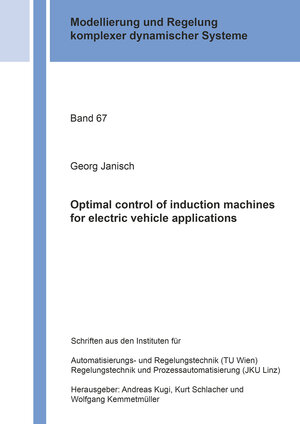
×
![Buchcover ISBN 9783844097122]()
Optimal control of induction machines for electric vehicle applications
von Georg JanischInduction machines are widely used in electric vehicles due to their high reliability and low cost. However, controlling these machines to meet the high-performance demands of electric vehicles presents a significant challenge. The nonlinearities of the machines are significant at these operating points. This makes nonlinear control theory increasingly common as the demands of high-performance drives increase, and high computing power becomes more accessible and available.
This work addresses the control problem using model-based optimal methods. Extended space vector models and magnetic equivalent circuit models are investigated and the model accuracy is verified using experiments. For the extended space vector models, this thesis describes a novel calibration procedure. The proposed calibration procedure is verified by measurements on a test bench. It is shown that a high model accuracy can be achieved with the calibrated model.
A novel MPC strategy for the high-performance control of induction machines used in electric vehicles is proposed. The approach is based on the mentioned magnetic nonlinear model. The proposed MPC strategy has a long prediction horizon and features a cost function that leads to high torque dynamics. Machine states and certain machine parameters are estimated online to overcome the sensor shortage of the considered application. The effectiveness and function of the proposed control strategy are verified by extensive tests on a vehicle machine in a test bench environment. The results show that the proposed method provides excellent performance compared to a state-of-the-art control. The proposed control approach offers an effective and energy-efficient solution for meeting the high demands of electric vehicles using induction machines.
This work addresses the control problem using model-based optimal methods. Extended space vector models and magnetic equivalent circuit models are investigated and the model accuracy is verified using experiments. For the extended space vector models, this thesis describes a novel calibration procedure. The proposed calibration procedure is verified by measurements on a test bench. It is shown that a high model accuracy can be achieved with the calibrated model.
A novel MPC strategy for the high-performance control of induction machines used in electric vehicles is proposed. The approach is based on the mentioned magnetic nonlinear model. The proposed MPC strategy has a long prediction horizon and features a cost function that leads to high torque dynamics. Machine states and certain machine parameters are estimated online to overcome the sensor shortage of the considered application. The effectiveness and function of the proposed control strategy are verified by extensive tests on a vehicle machine in a test bench environment. The results show that the proposed method provides excellent performance compared to a state-of-the-art control. The proposed control approach offers an effective and energy-efficient solution for meeting the high demands of electric vehicles using induction machines.


